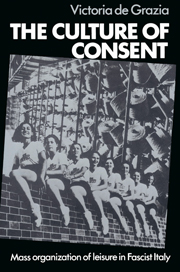Book contents
- Frontmatter
- Contents
- Preface
- 1 The organization of consent
- 2 The politics of after-work
- 3 Taylorizing worker leisure
- 4 The penetration of the countryside
- 5 Privileging the clerks
- 6 The nationalization of the public
- 7 The formation of fascist low culture
- 8 The limits of consent
- Abbreviations
- Notes
- Bibliography
- Index
4 - The penetration of the countryside
Published online by Cambridge University Press: 18 December 2009
- Frontmatter
- Contents
- Preface
- 1 The organization of consent
- 2 The politics of after-work
- 3 Taylorizing worker leisure
- 4 The penetration of the countryside
- 5 Privileging the clerks
- 6 The nationalization of the public
- 7 The formation of fascist low culture
- 8 The limits of consent
- Abbreviations
- Notes
- Bibliography
- Index
Summary
The “civilization” of the countryside by dominant urban cultures has been a constant process since the beginning of industrialization. Hastened from the early nineteenth century by the rapid spread of capitalist market relations, emigration from the land, universal military conscription, and the growth of state education systems, it has virtually been completed in the twentieth century by mobilization for “total” war, mass political movements, and the influence of the mass media. Fascism was in power during an especially crucial moment in this long process: when Italian agriculture was, so to speak, at the crossroads. Although half of the active population was still employed in agriculture in 1921, contributing over one-third of the entire national income, Italy was rapidly becoming an urban-industrial nation: From the mid-twenties on, the rural economy was being put under severe pressure to yield more agricultural surpluses, savings, and markets for industry. At the same time, central government was acquiring a formidable capacity to penetrate rural areas by means of the new networks of mass communication.
The fascists were nonetheless deeply ambivalent about using this power. Condescending toward the superstitions and oddities of the superficially understood world of the Italian peasantry, they were at the same time convinced of the superiority of its conservative rural values.
- Type
- Chapter
- Information
- The Culture of ConsentMass Organisation of Leisure in Fascist Italy, pp. 94 - 126Publisher: Cambridge University PressPrint publication year: 1981



